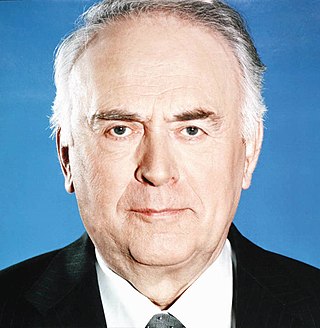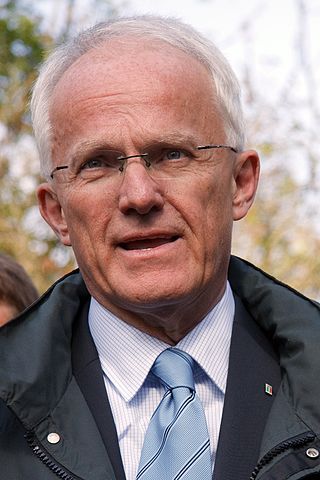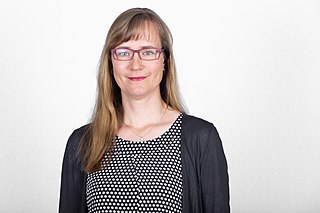Background
The CDU–FDP coalition had governed since the 2003. In the 2008 state election, the SPD under Wolfgang Jüttner lost more than three percentage points, suffering its worst ever result in Lower Saxony. The FDP retained their status as the third strongest party, leading the Greens by just 0.2%. The Left won 7.1 percent of the vote, crossing the electoral threshold and winning seats for the first time.
Most polls taken in early 2012 showed a SPD–Green majority. However, in the lead-up to the election, polls tightened, with the CDU–FDP coalition virtually neck and neck with the SPD–Green coalition. Polling suggested that the FDP's vote could be very close to 5%, which led some officials in the CDU to suggest tactically voting FDP to ensure it met the threshold. [1]
Before the election, the SPD and Greens announced their plan to govern and campaign together. The CDU acted independently of the FDP during the campaign, but sought to continue the incumbent coalition. If a CDU–FDP coalition could not be formed, the CDU stated that the SPD would be their second choice. However, the SPD itself rejected the idea of a grand coalition. [1]

The 2000 North Rhine-Westphalia state election was held on 14 May 2000 to elect the 13th Landtag of North Rhine-Westphalia. The outgoing government was a coalition of the Social Democratic Party (SPD) and The Greens led by Minister-President Wolfgang Clement.

The 2002 Saxony-Anhalt state election was held on 21 April 2002 to elect the members of the 4th Landtag of Saxony-Anhalt. The incumbent Social Democratic Party (SPD) minority government led by Minister-President Reinhard Höppner was defeated. The SPD fell to third place, while the Christian Democratic Union (CDU) moved into first. The CDU subsequently formed a coalition with the Free Democratic Party (FDP), and CDU leader Wolfgang Böhmer was elected Minister-President.

The 2005 North Rhine-Westphalia state election was held on 22 May 2005 to elect the 14th Landtag of North Rhine-Westphalia. The outgoing government was a coalition of the Social Democratic Party (SPD) and The Greens led by Minister-President Peer Steinbrück.

Federal elections were held in Germany on 18 September 2005 to elect the members of the 16th Bundestag. The snap election was called after the government's defeat in the North Rhine-Westphalia state election, which caused them to intentionally lose a motion of confidence to trigger an early federal election. The outgoing government was a coalition of the centre-left Social Democratic Party of Germany (SPD) and Alliance 90/The Greens, led by federal Chancellor Gerhard Schröder. The election was originally intended for the autumn of 2006.

The 2008 Hessian state election was held on 27 January 2008 to elect the members of the Landtag of Hesse. The incumbent Christian Democratic Union (CDU) government led by Minister-President Roland Koch lost its majority. The result of the election was extremely close but inconclusive, with the CDU winning just 3,500 votes (0.1%) more than the Social Democratic Party (SPD). Due to the entrance of The Left to the Landtag, neither the CDU–FDP or SPD–Green bloc garnered a majority. After a year of failed attempts to form government, a new election was held.

The 2010 North Rhine-Westphalia state election was held on 9 May 2010 to elect the 15th Landtag of North Rhine-Westphalia. The outgoing government was a coalition of the Christian Democratic Union (CDU) and Free Democratic Party (FDP) led by Minister-President Jürgen Rüttgers.

The 2013 Bavarian state election was held on 15 September 2013 to elect the 180 members of the 17th Landtag of Bavaria. It was held one week before the 2013 German federal election. The CSU regained the absolute majority it had lost in 2008, while the Free Democratic Party (FDP), a member of the outgoing governing coalition, fell below the 5% electoral threshold and lost all its seats. Minister-President Horst Seehofer continued in office.

The 2014 Saxony state election was held on 31 August 2014 to elect the members of the 6th Landtag of Saxony. The incumbent coalition government of the Christian Democratic Union (CDU) and Free Democratic Party (FDP) led by Minister-President Stanislaw Tillich was defeated as the FDP lost all its seats. The CDU subsequently formed a grand coalition with the Social Democratic Party (SPD), and Tillich was re-elected as Minister-President.

The 2016 Baden-Württemberg state election was held on 13 March 2016 to elect the members of the 15th Landtag of Baden-Württemberg. The incumbent government of The Greens and the Social Democratic Party (SPD) led by Minister-President Winfried Kretschmann lost its majority.

The 2016 Saxony-Anhalt state election was held on 13 March 2016 to elect the members of the 7th Landtag of Saxony-Anhalt. The incumbent grand coalition of the Christian Democratic Union (CDU) and Social Democratic Party (SPD) led by Minister-President Reiner Haseloff lost its majority. The Alternative for Germany (AfD) debuted at 24.3%, with every other parliamentary party recording losses, particularly the SPD and The Left.

The 2017 Lower Saxony state election was held on 15 October 2017 to elect the 18th Landtag of Lower Saxony. The incumbent coalition government of the Social Democratic Party (SPD) and The Greens led by Minister-President Stephan Weil was defeated. Though the SPD became the largest party in the Landtag largely fueled by the personal popularity of Weil, their gains were offset by losses for the Greens, depriving the government of its majority. The SPD subsequently formed a grand coalition with the Christian Democratic Union (CDU), and Weil continued as Minister-President.

The 2019 Saxony state election was held on 1 September 2019 to elect the members of the 7th Landtag of Saxony. The outgoing government was a grand coalition of the Christian Democratic Union (CDU) and Social Democratic Party (SPD) led by Minister-President Michael Kretschmer.

The 2019 Brandenburg state election was held on 1 September 2019 to elect the members of the 7th Landtag of Brandenburg. It took place on the same day as the 2019 Saxony state election. The outgoing government was a coalition of the Social Democratic Party (SPD) and The Left, led by Minister-President Dietmar Woidke.

The 2019 Thuringian state election was held on 27 October 2019 to elect the members of the 7th Landtag of Thuringia. The outgoing government was a coalition consisting of The Left, the Social Democratic Party (SPD), and The Greens, led by Minister-President Bodo Ramelow.

The 2021 Baden-Württemberg state election was held on 14 March 2021 to elect the 17th Landtag of Baden-Württemberg. The outgoing government was a coalition of Alliance 90/The Greens and the Christian Democratic Union (CDU) led by Minister-President Winfried Kretschmann.

The 2021 Saxony-Anhalt state election was held on 6 June 2021 to elect the 8th Landtag of Saxony-Anhalt. The outgoing government was coalition of the Christian Democratic Union (CDU), Social Democratic Party (SPD), and The Greens, led by Minister-President Reiner Haseloff.

The 2021 Rhineland-Palatinate state election was held on 14 March 2021 to elect the 18th Landtag of Rhineland-Palatinate. The outgoing government was a "traffic light coalition" of the Social Democratic Party (SPD), Free Democratic Party (FDP), and The Greens led by Minister-President Malu Dreyer.

The 2022 Lower Saxony state election was held on 9 October 2022 to elect the 19th Landtag of Lower Saxony. The incumbent government was a coalition of the Social Democratic Party of Germany (SPD) and Christian Democratic Union of Germany (CDU) led by Minister-President Stephan Weil.

The 2023 Hessian state elections was held on Sunday October 8, to elect the 21st Landtag of Hesse. The outgoing government was a coalition of the Christian Democratic Union and The Greens, led by Minister-President Boris Rhein of the CDU. The 2023 Bavarian state election was held the same day.

The 1982 Hessian state election was held on 26 September 1982 to elect the 10th Landtag of Hesse. The outgoing government was a coalition of the Social Democratic Party (SPD) and Free Democratic Party (FDP) led by Minister-President Holger Börner.


























